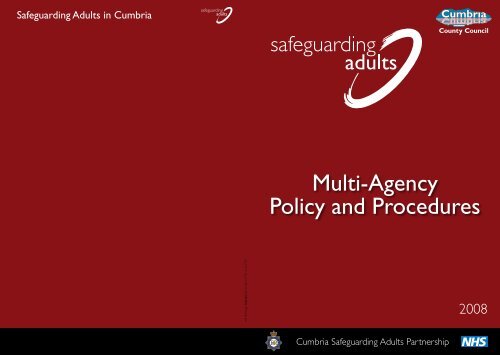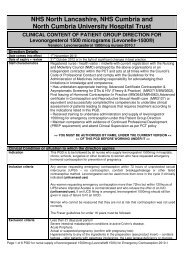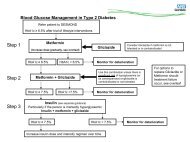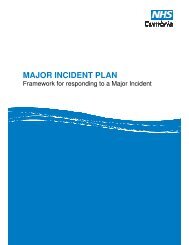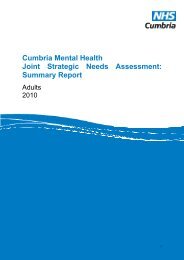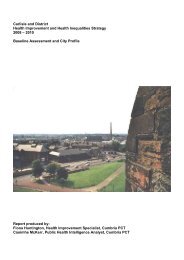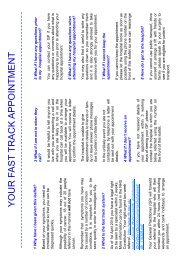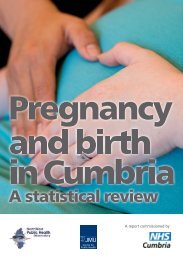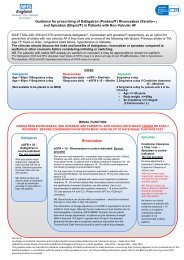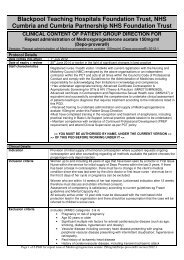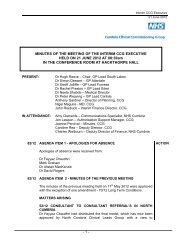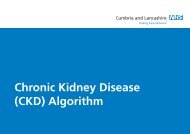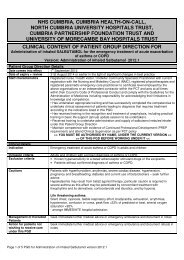Safeguarding - Multi-Agency Policy and Procedures - NHS Cumbria
Safeguarding - Multi-Agency Policy and Procedures - NHS Cumbria
Safeguarding - Multi-Agency Policy and Procedures - NHS Cumbria
- No tags were found...
You also want an ePaper? Increase the reach of your titles
YUMPU automatically turns print PDFs into web optimized ePapers that Google loves.
<strong>Safeguarding</strong> Adults in <strong>Cumbria</strong><strong>Multi</strong>-<strong>Agency</strong><strong>Policy</strong> <strong>and</strong> <strong>Procedures</strong>10418 Design 3cStudio Tel: 01228 221731 or 2217272008<strong>Cumbria</strong> <strong>Safeguarding</strong> Adults Partnership<strong>Cumbria</strong> <strong>Safeguarding</strong> Adults Partnership
<strong>Safeguarding</strong> Adults in <strong>Cumbria</strong> ContentsChapter 1Chapter 2Chapter 3Chapter 4Page NumberIntroduction_______________________________________4<strong>Policy</strong> statement___________________________________5Aims <strong>and</strong> objectives_________________________________6Consent <strong>and</strong> information sharing_ _____________________84.1 Information Sharing Protocol_______________________84.2 Capacity <strong>and</strong> consent_____________________________9Chapter 5 Prevention strategies_______________________________ 12Chapter 6 <strong>Safeguarding</strong> Adults________________________________ 156.1 Signs <strong>and</strong> symptoms_____________________________ 166.2 Abuse <strong>and</strong> neglect in institutional settings____________ 216.3 Domestic abuse________________________________24Chapter 7Chapter 8Chapter 9Best practice procedures___________________________26Your responsibilities_______________________________288.1 Carers, relatives <strong>and</strong> members of the public_ ________288.2 Residential care / nursing homes__________________288.3 Domiciliary care agencies________________________308.4 Day Centres__________________________________328.5 Sheltered housing / supported living schemes_ _______348.6 National Health Service Trusts / General Practitioners<strong>and</strong> surgery staff_______________________________368.7 <strong>Cumbria</strong> Constabulary__________________________378.8 Adult Social Care______________________________378.9 <strong>Cumbria</strong> Probation Service______________________378.10 Voluntary organisations_________________________38Allegations made against staff________________________399.1 Protection of Vulnerable Adults List (POVA)_________409.2 Notifiable occupations___________________________ 419.3 Out of county placements________________________42Chapter 10 The role of the regulator____________________________43Chapter 11 Useful contact numbers, addresses <strong>and</strong> websites_________44
<strong>Safeguarding</strong> Adults in <strong>Cumbria</strong> Chapter 1Introduction“Abuse is a violation of an individual’s human <strong>and</strong> civil rights by any otherperson or persons.” No Secrets (DH 2000)All citizens in <strong>Cumbria</strong> should have the right to choice <strong>and</strong> control in theirlives, free from discrimination, harassment <strong>and</strong> abuse. The County Councilis committed to working with its partner agencies to root out all forms ofabuse <strong>and</strong> mistreatment so that everyone is able to make a full <strong>and</strong> positivecontribution to society.Jill StannardDirectorAdult Social Care DirectorateChapter 2<strong>Policy</strong> statementIt is the policy of all the agencies that have contributed to this document towork in partnership <strong>and</strong> collaboration to enable all adults who “are or maybe eligible for community care services” to retain independence, well being<strong>and</strong> choice <strong>and</strong> to access their human right to live a life that is free fromabuse <strong>and</strong> neglect.It is expected that all agencies, settings <strong>and</strong> residential establishments ensurethat staff <strong>and</strong>/or volunteers are provided with training appropriate to thetasks they perform. This training should cover the recognition of abuse <strong>and</strong>neglect <strong>and</strong> the application of these guidelines.The following agencies have been involved in devising these procedures:These procedures <strong>and</strong> guidelines are designed to ensure that everyone,from whatever setting or situation, is aware of the definition of abuse, whatthey should do <strong>and</strong> who they should contact if they have any concerns at allabout the welfare or treatment of adults who may be at risk.This is a key document <strong>and</strong> forms part of <strong>Cumbria</strong>’s multi -agency approachto safeguarding vulnerable adults. As such it has been endorsed by allmembers of the <strong>Safeguarding</strong> Adults Partnership. It is intended to offerguidance for members of the public <strong>and</strong> the staff of statutory, voluntary <strong>and</strong>independent sector agencies throughout <strong>Cumbria</strong>.June 2008These procedures were first published in 1993, reviewed <strong>and</strong> revised in 1998<strong>and</strong> 2004, 2008.•••••••••••••<strong>Cumbria</strong> County Council, Adults <strong>and</strong> Cultural Services Directorate<strong>Cumbria</strong> ConstabularyCommission for Social Care InspectionCrown Prosecution ServiceUniversity Hospitals of Morecambe Bay <strong>NHS</strong> Trust<strong>NHS</strong> <strong>Cumbria</strong><strong>Cumbria</strong> Partnership <strong>NHS</strong> Foundation TrustNorth <strong>Cumbria</strong> University Hospitals <strong>NHS</strong> TrustNorth West Ambulance <strong>NHS</strong> TrustAge ConcernAlzheimers SocietyGlenmore TrustEden Community Alarms
<strong>Safeguarding</strong> Adults in <strong>Cumbria</strong> Chapter 3Aims <strong>and</strong> objectivesThese guidelines <strong>and</strong> procedures are designed to:It should be noted that these procedures are not designed to hinderor obstruct people from pursuing their chosen lifestyle. Normal riskassessments should minimise the risk of accidents during the normal ebb<strong>and</strong> flow of life. They should not in themselves be used to prevent someonefrom living a life of independence, choice <strong>and</strong> fulfilment.• Prevent the abuse <strong>and</strong> neglect of adults who are or may be in need ofcommunity care services.• Promote increased awareness <strong>and</strong> recognition of the issues surroundingthe abuse <strong>and</strong> neglect.• Ensure that when abuse is suspected, appropriate action is taken tosafeguard the adults concerned from further harm or exploitation.• Ensure that allegations about abuse or neglect are investigatedthoroughly, efficiently <strong>and</strong> consistently.• Respect the rights of all people to live their chosen lifestyle with privacy,dignity, independence, choice <strong>and</strong> fulfilment.In order to achieve these aims the procedures <strong>and</strong> guidelines will:• Offer advice on prevention strategies.• Establish effective inter-agency communication.• St<strong>and</strong>ardise referral <strong>and</strong> response procedures within <strong>and</strong> across differentagencies.• Provide a framework for agencies to respond to cases of suspectedabuse or neglect.• Give clear definitions of abuse or neglect.• Define the role of each separate agency or establishment in theinvestigation of suspected abuse or neglect.• Describe how to develop an effective safeguarding plan for the effectivefuture protection of the adults concerned.
10 <strong>Safeguarding</strong> Adults in <strong>Cumbria</strong> 11The Act sets out a single clear test for assessing whether a person lackscapacity to take a particular decision at a particular time. It is a “decisionspecific”test. No one can be labelled “incapable” as a result of a particularmedical condition or diagnosis. The Act makes it clear that a lack of capacitycannot be established merely by reference to a person’s age, appearance,or any other condition or aspect of a person’s behaviour, which might leadothers to make unjustified assumptions about capacity.Everything that is done for or on behalf of a person who lacks capacity mustbe in that person’s best interests. The Act provides a checklist of factorsthat decision-makers must work through in deciding what is in a person’sbest interests. A person can put his/her wishes <strong>and</strong> feelings into a writtenstatement if they so wish, which the person making the determination mustconsider. Also, the Act gives carers <strong>and</strong> family members the right to beconsulted.Local Authorities <strong>and</strong> the <strong>NHS</strong> can only instruct an IMCA if they proposeto take, or have already taken, protective measures. This is in accordancewith the local multi-agency safeguarding adults procedures.In safeguarding adults cases, access to IMCAs is not restricted to peoplewho have no one else to support or represent them. People who lackcapacity who do have family <strong>and</strong> friends are still entitled to have an IMCAto support them in safeguarding adults procedures.The Act also introduces a new criminal offence of ill treatment or neglect ofa person who lacks capacity. A person found guilty of such an offence maybe liable to imprisonment for a term of up to five years.Independent Mental Capacity Advocacy ServiceThis is a new type of statutory advocacy service introduced by the MentalCapacity Act 2005.Local Authorities <strong>and</strong> the <strong>NHS</strong> have powers to instruct an IndependentMental Capacity Advocate (IMCA) to support <strong>and</strong> represent a person wholacks capacity where:• It is alleged that the person is or has been abused or neglected byanother person.• It is alleged that the person is abusing or has abused another person.
12 <strong>Safeguarding</strong> Adults in <strong>Cumbria</strong> 13Chapter 5Prevention strategiesThese guidelines <strong>and</strong> procedures have been designed primarily to ensurethat everyone underst<strong>and</strong>s what abuse is <strong>and</strong> that allegations are dealt withconsistently <strong>and</strong> systematically by all agencies.But it is important to remember that the ultimate intention of anysafeguarding policy is to prevent the abuse <strong>and</strong> neglect. Everyone has aresponsibility to ensure that those at risk of abuse <strong>and</strong> neglect are madeaware of how they can complain about things that concern or worry them.Aspects of people’s lives that can explain increased vulnerability to abuseinclude:• Lack of inclusion in protective social networks, including education <strong>and</strong>employment.• Dependency on others (who may misuse their position) for vital needsincluding mobility, access to information <strong>and</strong> control of finances.• Lack of access to remedies for abuse <strong>and</strong> neglect.• Social acceptability of low st<strong>and</strong>ards for care <strong>and</strong> treatment.• Social acceptability of domestic abuse.• Dynamics of power within institutional settings.Prevention of abuse <strong>and</strong> neglect in the community:• The message that it is everyone’s right to live a life free from abuse <strong>and</strong>neglect should be actively promoted to the public by all partner agencies.• Information about abuse <strong>and</strong> neglect should be readily available to allmembers of the public.• Activities aimed at enhancing personal safety including advocacy schemesshould be made available to those who have experienced or are at riskof abuse.• People who are known to pose a risk to others in the community,including those covered by the <strong>Safeguarding</strong> Adults <strong>Policy</strong>, are thesubject of a plan drawn up under the <strong>Multi</strong>-<strong>Agency</strong> Protection PanelArrangements (MAPPA).Prevention of abuse <strong>and</strong> neglect within service delivery:• Adults who are receiving community care services can be at risk whilstreceiving them, both in care settings <strong>and</strong> in their own homes.• Successful prevention of adult abuse <strong>and</strong> neglect dem<strong>and</strong>s that serviceproviders tackle factors which contribute to its occurrence at all levels.• Commissioners <strong>and</strong> regulators of community care services play a vitalrole in ensuring that people receive care services from organisationswhich implement st<strong>and</strong>ards that prevent abuse <strong>and</strong> neglect.• Organisations regulated by CSCI, <strong>and</strong> commissioned through PCTs <strong>and</strong>the Local Authority must be expected to fulfil the following st<strong>and</strong>ards:o Each partner agency has a clear, well publicised policy of Zero-Tolerance of abuse.o The policy is underpinned by clear procedures that cover all incidentsof abuse from any person towards any other.o All incidents of abuse are referred to the local authority without delay.o All staff, volunteers , service users <strong>and</strong> carers are aware ofsafeguarding policy <strong>and</strong> procedures.o Each partner agency has clear policies against discrimination <strong>and</strong>harassment towards any person on any grounds.o Complaints procedures are clear, accessible <strong>and</strong> well publicised.o Each partner agency has a procedure by which staff <strong>and</strong> volunteerscan raise concerns (whistle blowing).
16 <strong>Safeguarding</strong> Adults in <strong>Cumbria</strong> 176.1 Signs <strong>and</strong> symptoms• The following are useful descriptions of the various forms of abuse. It isimportant to remember that the presence of one or more indicatorsdoes not confirm abuse or neglect.• A cluster of several signs <strong>and</strong> indicators may suggest a potential forabuse or neglect <strong>and</strong> may identify the need for further assessment of thesituation.• However, there may be other explanations not related to abuse.• It should also be noted that many psychological or emotional signs <strong>and</strong>symptoms may be evident in several types of abuse.6.1.1 Physical abusePain or physical injury which is either caused deliberately or through lack of care.It can include:• Hitting• Slapping• Pushing• Kicking• Misuse of medication• Forcible administration of medication• Force feeding• The use of inappropriate methods of restraint• The use of inappropriate sanctions• The use of inappropriate moving <strong>and</strong> h<strong>and</strong>ling techniquesIndicators may be:• A history of unexplained falls or minor injuries• Unexplained bruises of varying ages• Unexplained fractures or fractures of varying ages• Injuries reflecting the shape of an implement or object• Unexplained burns or scalds particularly to feet, back or palms of theh<strong>and</strong>s• Rope or cigarette burns• Injuries to head, face or scalp• Signs of the over or under use of medication• Excessive or inappropriate use of restraints, confinement or control6.1.2 Psychological abuseActs or behaviour that can cause emotional distress or anguish. These caninclude:• Threats of harm, ab<strong>and</strong>onment or isolation• Deprivation of contact with others including denial of access to visitorsor care networks• Humiliation• Blaming• Controlling• Intimidation• Verbal abuse• Denial of choice
24 <strong>Safeguarding</strong> Adults in <strong>Cumbria</strong> 256.3 Domestic abuseSome forms of abuse, <strong>and</strong> neglect may be classed as domestic abuse.Defined locally as:“any incident of threatening behaviour, violence or abuse (psychological, physical,sexual, financial or emotional) between adults aged 18 <strong>and</strong> over who areor have been intimate partners or family members, regardless of gender orsexuality.”• Currently claims 150 lives a year• Can be perpetrated by family or extended family members• Rarely a one-off incidento Should be seen as a pattern of abusive <strong>and</strong> controlling behaviourthrough which the abuser seeks power over their victim• There is a strong connection between domestic abuse <strong>and</strong> child abuse• MARAC (<strong>Multi</strong>-<strong>Agency</strong> Risk Assessment Conferencing) arrangementsare in place in <strong>Cumbria</strong>o A process for sharing information amongst agencies in relation to highrisk victims of domestic abuseo www.caada.org.uk
26 <strong>Safeguarding</strong> Adults in <strong>Cumbria</strong> 27Chapter 7Best practice proceduresThe aim of <strong>Safeguarding</strong> Adults procedures is to enable people who are at risk ofabuse or neglect to access safety. The process below follows best practice procedurethrough all of its stages.The procedures detailthe following stages:Stage 1AlertStage 2Referral(to Adult Social Care)Stage 3Decision (by Adult SocialCare Team)Stage 4<strong>Safeguarding</strong> assessmentstrategy (multi-agency)Reporting concerns of abuse or neglectwhich are received or noticed within apartner organisation.Any immediate protection needs areaddressed.Placing information about that concern intoa multi agency context by referral to the<strong>Safeguarding</strong> <strong>Procedures</strong>.Deciding whether the <strong>Safeguarding</strong> Adults<strong>Procedures</strong> are appropriate to address theconcern.Formulating a multi-agency plan for assessingthe risk <strong>and</strong> addressing any immediateprotection needs.Maximum timeframeImmediate action tosafeguard anyone atimmediate risk.Within the sameworking day.By the end of the sameworking day.Within 5 working days.Stage 5<strong>Safeguarding</strong> assessment(multi-agency)Stage 6<strong>Safeguarding</strong> plan(multi-agency)Stage 7Review of <strong>Safeguarding</strong>Plan (multi-agency)Co-ordinating the collection of informationabout abuse or neglect that has occurred ormight occur. This may include an investigatione.g. a criminal or disciplinary.Co-ordinating a multi-agency response to therisk of abuse that has been identified.Within 4 weeks of thesafeguarding referral.Within 4 weeks of thesafeguarding assessmentbeing completed.The review of that plan. Within 6 months ofthe first review <strong>and</strong>thereafter yearly.Recording <strong>and</strong> Monitoring Recording <strong>and</strong> monitoring the <strong>Safeguarding</strong>Adults process <strong>and</strong> its outcomes.• Allegations of abuse or neglect must be referred to the local office of Adult Social Care who havethe responsibility for coordinating all assessments <strong>and</strong> investigations. (Relevant phone numbers arein the back of these procedures).
28 <strong>Safeguarding</strong> Adults in <strong>Cumbria</strong> 29Chapter 8Your responsibilities8.1 Carers, relatives <strong>and</strong> members of the publicEveryone has a role to play in the detection of the abuse <strong>and</strong> neglect.Relatives, carers <strong>and</strong> members of the public are often in a better positionthan anyone else to notice changes to someone in their own family or aclose friend or neighbour <strong>and</strong> must not hesitate to bring concerns to theattention of someone who is in a position to help.Every reported incident of abuse or suspected abuse will be taken seriouslyby all the agencies involved. Concerns should be raised with:• The management of the service or agency concerned.• The local office of Adult Social Care (formerly the Social ServicesDepartment), (contact numbers at the back of this booklet.)• The Public Protection Unit of the <strong>Cumbria</strong> Police (local contact numbersat the back of this booklet.)8.2 Residential care / nursing homesEach establishment should identify a senior member of staff who willassume responsibility for the coordination of all measures to safeguardresidents. This person should coordinate training <strong>and</strong> ensure that it is madeavailable, at an appropriate level, for all staff. They should also take a leadin the development <strong>and</strong> implementation of a suitably robust safeguardingadults procedure, which is clearly written <strong>and</strong> given to all staff as part ofinduction.Policies <strong>and</strong> procedures must make clear to staff what their responsibilitiesare in the recognition <strong>and</strong> reporting of any suspicions they may have aboutabuse <strong>and</strong> neglect. As a basic minimum they should tell staff to:• Immediately report any suspicions to the senior member of staff on duty.If the suspicions are about that senior member of staff the proceduremust make clear who else to advise.• Take seriously any complaints made by individuals, relatives, visitors orother professionals <strong>and</strong> report them immediately.• Follow the staff guidelines for recording incidents.• Ensure that once a concern has been raised the manager has dealt it withappropriately.Managers must:• Raise the alert• Ensure the immediate safety of the individual(s) concerned.• Prevent the intimidation of witnesses including the individuals concerned<strong>and</strong> staff.• Consider the seriousness of the concerns.• Make initial enquiries about the concerns or suspicions.• Ensure that appropriate records have been kept both of the concern <strong>and</strong>the outcome of the initial enquiries.• Where it is possible that an offence may have been committed the localPublic Protection Unit of <strong>Cumbria</strong> Police should be notified (Contactnumbers are at the back of this booklet.)• Before the end of the day on which the concern is received the managermust contact the local office of <strong>Cumbria</strong> County Council Adult SocialCare (formerly Social Services Department) to advise that an allegationhas been received.• Where the alleged victim of abuse has been placed by another localauthority <strong>Cumbria</strong> Adult Social Care should be advised who to contactin the placing authority.
30 <strong>Safeguarding</strong> Adults in <strong>Cumbria</strong> 31Managers must not:• Interrogate witnesses• Interfere with or otherwise contaminate evidence• Initiate internal investigations (eg by auditors or other “independent”people)Staff, visitors, relatives or other professionals may have concerns about theway in which a home discharges its responsibilities towards the welfare <strong>and</strong>care of service users. These concerns should be dealt with in exactly thesame way as any other allegation of abuse or neglect.Remember, decisions by staff regarding whether or not to reportconcerns of abuse are not a matter of individual conscience but areconsidered a professional duty.8.3 Domiciliary care agenciesAgencies should identify a senior member of staff who will assumeresponsibility for the coordination of all measures to safeguard service users.This person should coordinate training <strong>and</strong> ensure that it is made available,at an appropriate level, for all staff. They should also take a lead in thedevelopment <strong>and</strong> implementation of a suitably robust safeguarding adultsprocedure, which is clearly written <strong>and</strong> given to all staff as part of induction.Policies <strong>and</strong> procedures must make clear to staff what their responsibilitiesare in the recognition <strong>and</strong> reporting of any suspicions they may have aboutthe welfare of people who may be at risk of abuse or neglect.Each agency will have policies <strong>and</strong> procedures which reflect the ethos ofthat agency. However, as a basic minimum they should tell staff to:• Immediately report any suspicions to the manager on call. If thesuspicions are about that manager the procedure must make clear whoelse to advise.• Take seriously any complaints made by service users, relatives, visitors orother professionals <strong>and</strong> report them immediately.• Follow the staff guidelines for recording incidents.• Ensure that once a concern has been raised the manager has dealt it withappropriately.Managers must:• Raise the alert• Take seriously <strong>and</strong> listen carefully to reports or concerns raised byservice users, staff, relatives or other professionals.• Ensure the safety of the any individual(s) involved.• Prevent the intimidation of witnesses including service users <strong>and</strong> staff• Consider the seriousness of the concern.• Make initial enquiries about the concerns or suspicions.• Ensure that appropriate records have been kept both of the concerns<strong>and</strong> the outcome of the initial enquiries.• Where it is possible that an offence may have been committed the localPublic Protection Unit of <strong>Cumbria</strong> Police should be notified (Contactnumbers are at the back of this booklet.)• Before the end of the day on which the allegation is received themanager must contact the local office of Adult Social Care (formerlySocial Services Department) to advise that an allegation has beenreceived.
32 <strong>Safeguarding</strong> Adults in <strong>Cumbria</strong> 33Managers must not:• Interrogate witnesses• Interfere with or otherwise contaminate evidence• Initiate internal investigations (eg by auditors or other ‘independent’people)Staff, service users, relatives or other professionals may have concernsabout the way in which an agency discharges its responsibilities towards thewelfare <strong>and</strong> care of service users. These concerns should be dealt with inexactly the same way as any other allegation of abuse or neglect.Remember, decisions by staff regarding whether or not to reportconcerns of abuse are not a matter of individual conscience but areconsidered a professional duty.8.4 Day CentresDay Centres should identify a senior member of staff who will assumeresponsibility for the coordination of all measures to safeguard serviceusers. This person should coordinate training <strong>and</strong> ensure that it is madeavailable, at an appropriate level, for all staff <strong>and</strong> volunteers. They shouldalso take a lead in the development <strong>and</strong> implementation of a suitably robustsafeguarding adults procedure, which is clearly written <strong>and</strong> given to all staff<strong>and</strong> volunteers as part of induction.Policies <strong>and</strong> procedures must make clear to staff <strong>and</strong> volunteers what theirresponsibilities are in the recognition <strong>and</strong> reporting of any concerns theymay have about the health, welfare or safety of adults in their care.Each Day Centre will have policies <strong>and</strong> procedures which reflect the ethosof that facility. However, as a basic minimum they should tell staff <strong>and</strong>volunteers to:• Immediately report any concerns to the manager. If the suspicions areabout that manager the procedure must make clear who else to advise.• Take seriously any complaints made by service users, relatives, visitors orother professionals <strong>and</strong> report them immediately.• Follow the staff guidelines for recording incidents.• Ensure that once a concern has been raised the manager has dealt it withappropriately.Managers must:• Raise the alert• Take seriously <strong>and</strong> listen carefully to reports or suspicions raised byservice users, staff, relatives or other professionals.• Ensure the safety of the individuals concerned.• Prevent the intimidation of witnesses including service users <strong>and</strong> staff orvolunteers• Consider the seriousness of the concern.• Make initial enquiries about the concerns or suspicions.• Ensure that appropriate records have been kept both of the allegation<strong>and</strong> the outcome of the initial enquiries.• Where it is possible that an offence may have been committed the localChild <strong>and</strong> Adult Protection Unit of <strong>Cumbria</strong> Police should be notified(Contact numbers are at the back of this booklet.)• Before the end of the day on which the concern has been raised themanager must contact the local office of Adult Social Care (formerlySocial Services Department) to advise that an allegation has beenreceived.
34 <strong>Safeguarding</strong> Adults in <strong>Cumbria</strong> 35Managers must not:• Interrogate witnesses• Interfere with or otherwise contaminate evidence• Initiate internal investigations (eg by auditors or other ‘independent’people)Staff, service users, relatives or other professionals may have concerns aboutthe way in which a Day Centre discharges its responsibilities towards thewelfare <strong>and</strong> care of service users. These concerns should be dealt with inexactly the same way as any other allegation of abuse or neglect.Remember, decisions by staff regarding whether or not to reportconcerns of abuse are not a matter of individual conscience but areconsidered a professional duty.8.5 Sheltered housing / supported living schemesEach Scheme should identify a senior member of staff who will assumeresponsibility for the coordination of all measures to safeguard tenants.This person should coordinate training <strong>and</strong> ensure that it is made available,at an appropriate level, for all staff <strong>and</strong> any volunteers. They should alsotake a lead in the development <strong>and</strong> implementation of a suitably robustsafeguarding adults procedure, which is clearly written <strong>and</strong> given to all staff<strong>and</strong> volunteers as part of induction.Policies <strong>and</strong> procedures must make clear to staff <strong>and</strong> volunteers what theirresponsibilities are in the recognition <strong>and</strong> reporting of any concerns theymay have about the welfare of adults in their care.Each Scheme will have policies <strong>and</strong> procedures which reflect the ethosof that facility. However, as a basic minimum they should tell staff <strong>and</strong>volunteers to:• Immediately report any suspicions to the manager. If the suspicions areabout that manager the procedure must make clear who else to advise.• Take seriously any complaints made by tenants, relatives, visitors or otherprofessionals <strong>and</strong> report them immediately.• Follow the staff guidelines for recording incidents.• Ensure that once a concern has been raised the manager has dealt it withappropriately.Managers must:• Raise the alert• Take seriously <strong>and</strong> listen carefully to reports or suspicions raised bytenants staff, relatives or other professionals.• Ensure the safety of the individual(s) concerned.• Prevent the intimidation of witnesses including tenants <strong>and</strong> staff orvolunteers.• Consider the seriousness of the concerns.• Make initial enquiries about the concerns or suspicions.• Ensure that appropriate records have been kept both of the concern <strong>and</strong>the outcome of the initial enquiries.• Where it is possible that an offence may have been committed the localPublic protection Unit of <strong>Cumbria</strong> Police should be notified (Contactnumbers are at the back of this booklet.)• Before the end of the day on which the concern is raised the managermust contact the local office of Adult Social Care (formerly SocialServices Department) to advise that a concern has been raised.
36 <strong>Safeguarding</strong> Adults in <strong>Cumbria</strong> 37Managers must not:• Interrogate witnesses• Interfere with or otherwise contaminate evidence• Initiate internal investigations (eg by auditors or other ‘independent’ people)Staff, tenants, relatives or other professionals may have concerns about theway in which a Sheltered Housing Scheme discharges its responsibilitiestowards the welfare <strong>and</strong> care of service users. These concerns should bedealt with in exactly the same way as any other allegation of abuse or neglect.Remember, decisions by staff regarding whether or not to reportconcerns of abuse are not a matter of individual conscience but areconsidered a professional duty.8.6 National Health Service Trusts, General Practitioners <strong>and</strong>surgery staffStaff from each of the Trusts will already have policies <strong>and</strong> procedures inplace advising them what to do in the event that they either have concernsor witness abuse or neglect or allegations are made to them by a third party.These <strong>Procedures</strong> will be closely linked to these multi-agency guidelines.Trusts will identify senior staff who will be responsible for coordinating allaspects of safeguarding adults work, including training <strong>and</strong> the monitoring<strong>and</strong> reviewing of policies <strong>and</strong> procedures.All managers will be aware that any allegations of abuse or neglect whichwarrant investigation should be discussed at the earliest opportunity withthe Team Manager of the local Adult Social Care office.Managers must raise the alert.General Practitioners <strong>and</strong> surgery staff have a vital role to play inhighlighting concerns about the possible abuse or neglect of patients. Eachpractice should have procedures in place so that all staff are aware ofwhat to do should they have concerns or suspicions. Practices should havecontact details for staff within the PCT whom they can contact for advice<strong>and</strong> support.Primary Care Trusts should offer, <strong>and</strong> encourage the take up of safeguardingadults training for surgery staff.Remember, decisions by staff regarding whether or not to reportconcerns of abuse are not a matter of individual conscience but areconsidered a professional duty.8.7 <strong>Cumbria</strong> Constabulary<strong>Cumbria</strong> Constabulary staff should consult their <strong>Policy</strong> relating to<strong>Safeguarding</strong> Adults for guidance.8.8 Adult Social CareThe <strong>Safeguarding</strong> Adults Procedure No. 20030 must be followed whenan allegation of abuse or neglect is received. This gives clear advice <strong>and</strong>guidance in every aspect of investigating <strong>and</strong> managing an allegation. It isessential that robust protection plans are put into place in order to ensurethat adults are safeguarded from abuse <strong>and</strong> neglect. However, these planswill only be useful <strong>and</strong> effective if all agencies have been involved in theplanning process.8.9 <strong>Cumbria</strong> Probation ServiceContact your local Adult Social Care office <strong>and</strong> inform them of yourconcerns. Follow the Adult Protection procedures – there is a copy in eachoffice location.
38 <strong>Safeguarding</strong> Adults in <strong>Cumbria</strong> 398.10 Voluntary organisationsAll voluntary organisations must have policies in place which clearly set outthe organisations’ commitment to safeguarding adults <strong>and</strong> which reflecttheir own individual ethos. <strong>Procedures</strong> should include the organisations’policy on recruitment <strong>and</strong> selection, vetting, with clear reference to legalrequirements (<strong>Safeguarding</strong> Vulnerable Groups Act 2006) formerly POVAchecks.As a basic minimum the procedure should tell staff <strong>and</strong> volunteers:• What to look for <strong>and</strong> what should raise their concerns• What to do <strong>and</strong> who to tell• What steps to take to ensure the immediate safety of an individual at riskor abuse or neglectChapter 9Allegations made against staff“Employers who are also service providers or service commissioners have notonly a duty to the victim of abuse but also a responsibility to take action inrelation to the employee when allegations of abuse are made against him or her.Employers should ensure that their disciplinary procedures are compatible withthe responsibility to protect vulnerable adults.”(No Secrets, DoH 2000)• If a manager becomes aware that a member of staff is or may beresponsible for abuse or neglect of someone in their care they shoulduse their own internal safeguarding adults procedures.• It is advisable for Managers to seek guidance from POVA at this stageabout the possibility of any referral.• If it appears that an offence has been committed the employer shouldreport the matter to the local Police.o In all other cases the employer must report their concerns to the localAdult Social Care Office <strong>and</strong> advise what action they have taken toprotect service users.• If it appears that more information is required then the relevant TeamManager within Adult Social Care will coordinate the enquiry, initially bycalling a multi-agency, safeguarding assessment strategy meeting.• The employer should ensure that they comply with employmentlegislation at all times.• They may carry out their own internal enquiry into the issues raisedprovided this does not interfere with either the <strong>Safeguarding</strong> Adultsassessment or any criminal investigation.
40 <strong>Safeguarding</strong> Adults in <strong>Cumbria</strong> 41• Where the employer wishes to conduct a disciplinary investigationbefore the completion of the safeguarding adults assessment/investigation, this should be discussed with <strong>and</strong> agreed at the<strong>Safeguarding</strong> Assessment Strategy or with the officer coordinating theinvestigation.• Services registered under the Care St<strong>and</strong>ards Act 2000 must notify theCommission for Social Care Inspection that an allegation has been madeabout a member of staff.• Any possible sanctions against the employee are the responsibility of theemployer who must abide by employment law at all times.• It is advisable for Managers to seek guidance from POVA at this stageabout the possibility of any referral.• However as part of the discussion surrounding the ongoing protectionof the victim, the <strong>Safeguarding</strong> Planning meeting should consider whatsteps the employer might consider taking.These may include:• Whether the employee is removed from the area of work or careposition on a temporary basis to allow the employer to make a decisionabout further sanctions.• Referral to the employer’s disciplinary procedures9.1 Protection of Vulnerable Adults List (POVA)The list of people considered unsuitable to work with vulnerable adultsis known as the Protection of Vulnerable Adults List (POVA). The list iscurrently maintained by the Department for Education <strong>and</strong> Skills on behalfof the Department of Health. The Care St<strong>and</strong>ards Act 2000 Sections 81– 82 set out the relevant legislative details. The Social Care Institute forExcellence (SCIE) has published guidance called “Making referrals to theProtection of Vulnerable Adults (POVA) list” (SCIE June 2006). Thisguidance may be found on the SCIE website www.scie.org.ukAdditional guidance may be obtained from the Department of Healthwebsite www.dh.gov.ukPOVA referral forms may be obtained from:www.dh.gov.uk/assetRoot/04/11/66/36/04116636.rtfCurrently, the POVA scheme does not extend to <strong>NHS</strong> staff. TheGovernment fully intends for all health services eventually to be includedbut at the time of publication, employers who dismiss unsuitable staff from aHealth Service Trust are not able to have those names included on POVA.Please note that the POVA list is soon to be replaced by the Independent<strong>Safeguarding</strong> Authority as the <strong>Safeguarding</strong> Vulnerable Groups Act 2006comes into force, projected date April 2009.9.2 Notifiable occupations• If a person in a notifiable occupation (for example social care or healthstaff) is arrested or summoned for a relevant offence (for example, onewhich includes violence, indecency, dishonesty), the police will considerwhether, given the circumstances of the case <strong>and</strong> available evidence,there is an urgent or pressing need to disclose details relating to theoffence <strong>and</strong> impending prosecution.• Disclosure may be made (under common law) if it appears that theperson is an immediate risk to children or vulnerable people in his role<strong>and</strong> that the employer should be informed so that appropriate steps maybe taken to minimise that risk.• Disclosure would be limited to the essentials needed for the employer toconsider what action to take.• Should the person subsequently be convicted of the offence theemployer would in any event be notified of the conviction.
42 <strong>Safeguarding</strong> Adults in <strong>Cumbria</strong> 43• It is obvious therefore that any prior disclosure would only be done inexceptional circumstances <strong>and</strong> where an assessment of risk indicates thatdisclosure is justified because it is believed that an immediate risk may beposed.The public protection role of the police is to supply the employer withrelevant information for them to consider what action may be appropriate.Decisions about suspension or dismissal always remain with theemployer.• It is advisable for Managers to seek guidance from POVA at this stageabout the referral process.9.3 Out of county placements• A local authority from another part of the country may have placed aperson in an establishment in <strong>Cumbria</strong>.• Any allegations about abuse or neglect of that person remain theresponsibility of <strong>Cumbria</strong> County Council <strong>and</strong> must be investigatedunder <strong>Cumbria</strong>’s procedures, with Adult Social Care staff taking the leadin the investigation.• The placing authority should be made aware of the situationimmediately <strong>and</strong> invited to Inter-agency Consultation Meetings <strong>and</strong> CaseConferences.• Similarly allegations concerning a person placed by <strong>Cumbria</strong> in anotherauthority will be investigated <strong>and</strong> led by that authority.Chapter 10The role of the regulatorThe Commission for Social Care Inspection (CSCI) has a statutoryresponsibility for the regulation of Residential <strong>and</strong> Nursing Homes <strong>and</strong>Domiciliary Care Agencies in Engl<strong>and</strong>. These services are registered withCSCI, are subject to regular inspections <strong>and</strong> are required to meet nationalminimum st<strong>and</strong>ards. Under the Care Homes Regulations, care homes havea duty to report adult protection issues to the Commission <strong>and</strong> the localoffice of CSCI (contact number at the back of these procedures) shouldbe contacted if an allegation has been received about a regulated service.CSCI should also be invited to Inter-agency Consultation Meetings <strong>and</strong> insome circumstances inspectors may take an active part in the investigationprocess.Following the completion of an investigation, evidence may be found whichsuggests that the regulated service was at fault. In these circumstances theCommission has a range of powers available under the Care St<strong>and</strong>ards Act2000. Managers <strong>and</strong> inspectors within the Commission will make decisionsabout legal action against a regulated service.
44 <strong>Safeguarding</strong> Adults in <strong>Cumbria</strong> 45Chapter 11Useful contact numbers, addresses <strong>and</strong> websitesAdult Social Care offices <strong>and</strong> work bases<strong>Safeguarding</strong> Adults Co-ordinatorCounty OfficesKendal LA9 4RQTelephone 01539 713398Main officesCarlisleEdenCivic CentreFriargateRickergatePenrithCarlisle CA3 8QGCA11 7NXTelephone 01228 227000 Telephone 01768 242242carlislessd@cumbriacc.gov.uk penrithssd@cumbriacc.gov.ukOn-line referrals for all offices:www.cumbria.gov.uk/socialservices/referralsEmergency Out of Hours Service county wide, telephone only01228 526690.Sub-officesWigtonEgremontWiza House, Station Road Town Hall, Main StreetWigton CA7 9BGEgremont CA22 2DBTelephone 016973 66120 Telephone 01946 820270UlverstonBrogden StreetUlverston LA12 7AHTelephone 01229 894015AllerdaleCopel<strong>and</strong>New Oxford StreetSomerset HouseWorkingtonDuke StreetCA14 2LWWhitehaven CA28 7SQTelephone 01900 706325 Telephone 01946 852852workingtonssd@cumbriacc.gov.uk whitehavenssd@cumbriacc.gov.ukSouth Lakel<strong>and</strong>Barrow-in-FurnessCounty OfficesMarket StreetKendal LA9 4RQBarrow-in-Furness LA14 2LHTelephone 01539 713377 Telephone 01229 407894kendalssd@cumbriacc.gov.uk barrowssd@cumbriacc.gov.uk
46 <strong>Safeguarding</strong> Adults in <strong>Cumbria</strong> 47Adult Community Mental Health TeamsCarlisleAllerdale11 Portl<strong>and</strong> Square Park Lane ClinicCarlisle CA1 1PYWorkington CA14 2RRTelephone 01228 603850 Telephone 01900 872122Barrow-in-FurnessPenrithDuddon HouseThe Beacon Unit2 Fairfield Lane Penrith HospitalBarrow LA13 9AZCA11 8HXTelephone 01229 407777 Telephone 01768 245351BramptonCopel<strong>and</strong>Room 211,Richmond HouseWarwick Mill Business Centre WhitehavenCarlisle CA4 8RRCA28 7RBTelephone 01228 564504 Telephone 01946 852985KendalWigtonKinta HouseBrookside CentreHelme CloseBirdcage WalkKendal LA9 7HYWigton CA7 9AWTelephone 01539 732059 Telephone 016973 66650Older Adult Community Mental Health TeamsCarlisleAllerdaleCarleton ClinicUnit 20, Lillyhall Business ParkCumwhinton RoadJubilee roadCarlisle CA1 3SXWorkington CA14 4HATelephone 01228 602000 Telephone 01900 700131Barrow-in-FurnessBramptonDane GarthElla Thompson CentreFurness General HospitalUnion LaneBarrow LA14 4LFBrampton CA8 1BXTelephone 01229 491348 Telephone 016977 41781Copel<strong>and</strong>South Copel<strong>and</strong>Windermere Day Hospital Jubilee CentreWest Cumberl<strong>and</strong> Hospital 2 Lapstone BungalowsWhitehaven CA28 8JGMillom LA18 4BYTelephone 01946 693181 Telephone 01229 774974EdenPenrith HospitalCA11 8HXTelephone 01768 245331South Lakel<strong>and</strong>Kirkstone UnitWestmorl<strong>and</strong> General HospitalKendal LA9 7RGTelephone 01539 795468Wigton<strong>Safeguarding</strong> Adults TeamFellwood UnitAustin Hall BlockWigton HospitalCounty OfficesCA7 9DDKendal LA9 4RQTelephone 016973 66612 Telephone 01539 713398
48 <strong>Safeguarding</strong> Adults in <strong>Cumbria</strong> 49Hospitals with social work teamsCumberl<strong>and</strong> InfirmaryWestmorl<strong>and</strong> General HospitalNewtown RoadBurton RoadCarlisleKendal<strong>Cumbria</strong> CA2 7HY<strong>Cumbria</strong> LA9 7RGTelephone 01228 523444 Telephone 01539 732288West Cumberl<strong>and</strong> Hospital Furness General HospitalHensinghamDalton LaneWhitehavenBarrow-in-Furness<strong>Cumbria</strong> CA28 8JG<strong>Cumbria</strong> LA14 4LFTelephone 01946 693181 Telephone 01229 870870<strong>Cumbria</strong> Constabulary Public Protection UnitsPolice StationPolice StationMarket StreetCitidel RowBarrow-in-Furness LA14 2LE Carlisle CA3 8SGTelephone 0845 3300 247 Telephone 0845 3300 247Police StationPolice StationHall BrowBusher WalkWorkington CA14 4APKendal LA9 4RJTelephone 0845 3300 247 Telephone 0845 3300 247Action on Elder Abuse Response LineOffers a confidential help line providing information <strong>and</strong> emotional supportTelephone 080 8808 8141enquiries@elderabuse.org.ukThe Ann Craft TrustMaintains an information exchange network, raising the general level ofawareness of issues relating to the abuse of people with learning disabilities.Telephone 0115 979 9987Public Concern at WorkProvides legal advice to individuals concerned about malpractices at work.Telephone 0207 4046 609Counsel <strong>and</strong> CareProvides expertise in residential <strong>and</strong> nursing home care. Runs an advice linefor older people, carers <strong>and</strong> relatives.Telephone 0207 4851 566Carlisle People FirstProvides advocacy for <strong>and</strong> by people with learning disabilities.Telephone 01228 595 515www.peoplefirst.co.ukAlzheimers Society Help LineTelephone 0845 300 0366info@alzheimers.org.ukCommission for Social Care InspectionRegisters <strong>and</strong> inspects all care homes <strong>and</strong> domiciliary care agenciesTelephone 0845 015 0120enquiries@csci.gsi.gov.uk
50 <strong>Safeguarding</strong> Adults in <strong>Cumbria</strong> 51Voice UKVoluntary organisation supporting <strong>and</strong> campaigning for victims of abuse.Telephone 0845 1228695voice@voiceuk.org.ukDepartment of Healthwww.dh.gov.ukSocial Care Institute for Excellencewww.scie.org.ukIndependent <strong>Safeguarding</strong> Authoritywww.isa-gov.org.uk


